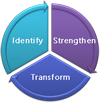Feuerstein’s Developmental Enrichment Program (FIE)
Equipping Minds builds on the work of Dr. Reuven Feuerstein. Carol and Kyle are honored to have trained in the Feuerstein Program and implement it with Equipping Minds.
Feuerstein’s Instrumental Enrichment was developed by the Israeli psychologist Dr. Reuven Feuerstein in the 1950’s. It has been successfully used as a tool for the enhancement of learning potential. It is a systematic program to provide mediation and remediation of a complete range of cognitive strategies which apply to all areas of learning as well as to outside-school areas such as family life, career choice, and general problem-solving. Feuersteins’ Developmental Enrichment Program (FIE) is aimed at enhancing students’ cognitive functions necessary for academic learning and achievement. The fundamental assumption of the program is that intelligence is dynamic and modifiable, not static or fixed. The FIE program seeks to correct the deficiencies in fundamental thinking skills, and provides students with the concepts, skills, strategies, operations and techniques necessary to function as independent learners, increase their motivation, and develop metacognition – in short, to “learn how to learn.”
The program seeks to:
- Correct deficiencies in fundamental thinking skills.
- Provide students with the concepts, skills, strategies, operations and techniques necessary to function as independent learners.
- Diagnose and help students learn how to learn.
Overall, FIE does not teach a student “what” to think but “how” to think. It provides a language students can use to express themselves.Through the use of FIE, students gain language and knowledge about their cognitive processes that help them make better decisions, in the classroom, in their out-of-school life and in their futures.
To date, the FIE program has been successfully used in the following frameworks:
- Enrichment programs for underachieving, regular and gifted children.
- Remedial programs for special needs children.
- Cognitive rehabilitation of brain injured individuals and psychiatric patients.
- Professional training and retraining programs in the industrial, military and business sectors.
- Prevention of the deterioration of cognitive functions in the elderly.
The program uses a variety of color-based manipulative and paper-and-pencil activities to enable the learner to concentrate on acquiring such critical strategies as comparing, categorizing, sequencing, and much more, in order to then apply these to all areas of the regular school curriculum. Important in the instructional process, to be carried out by especially trained teaching staff, is metacognition—the regular reflection by students on the mental processes that they use in problem-solving so that they can eventually become autonomous problem-solvers who are consciously aware of the mental tools which they can bring to bear on any academic or other situation. The program has been successfully implemented in more than 70 countries as a tool for enhancing learning potential for a wide range of student needs.
